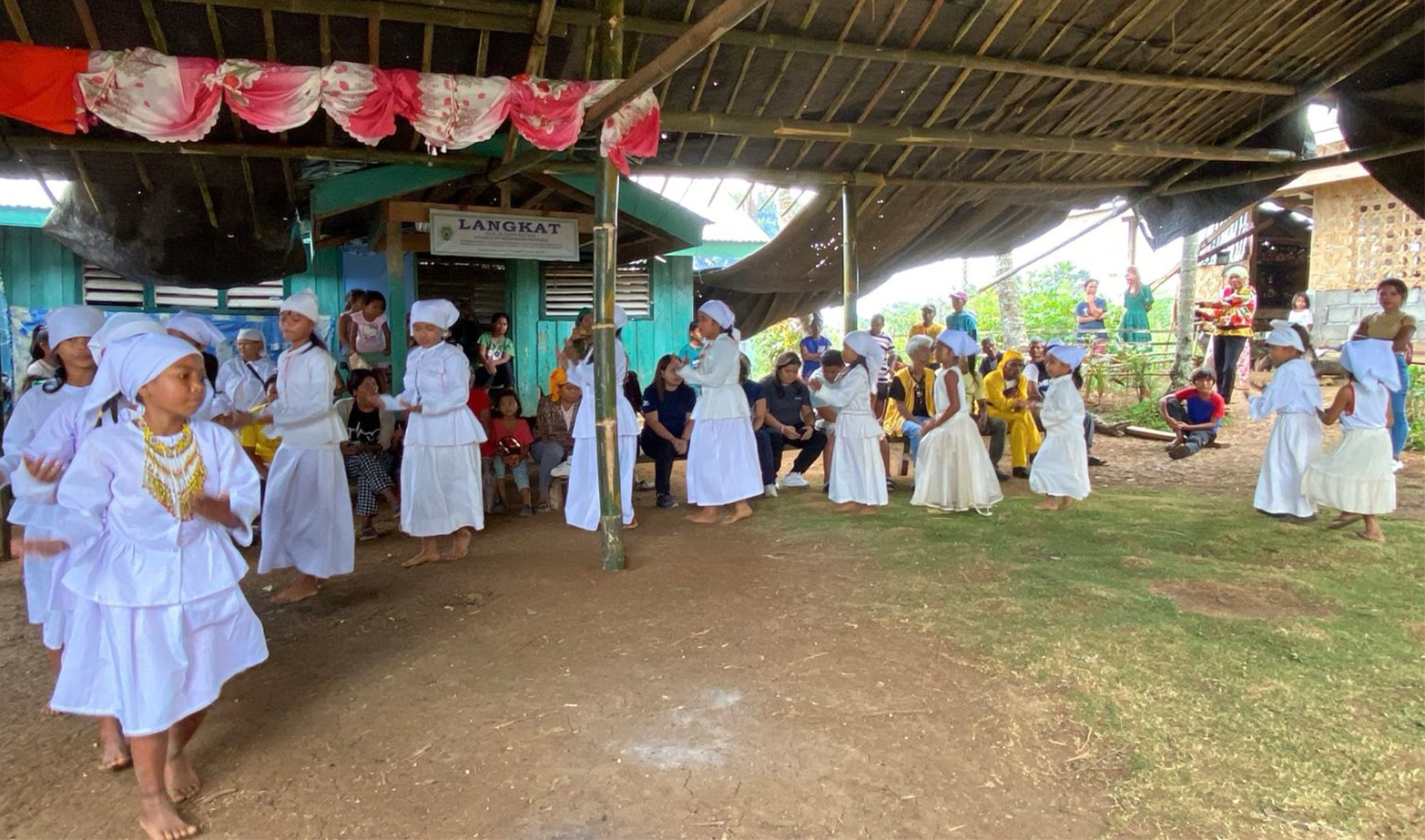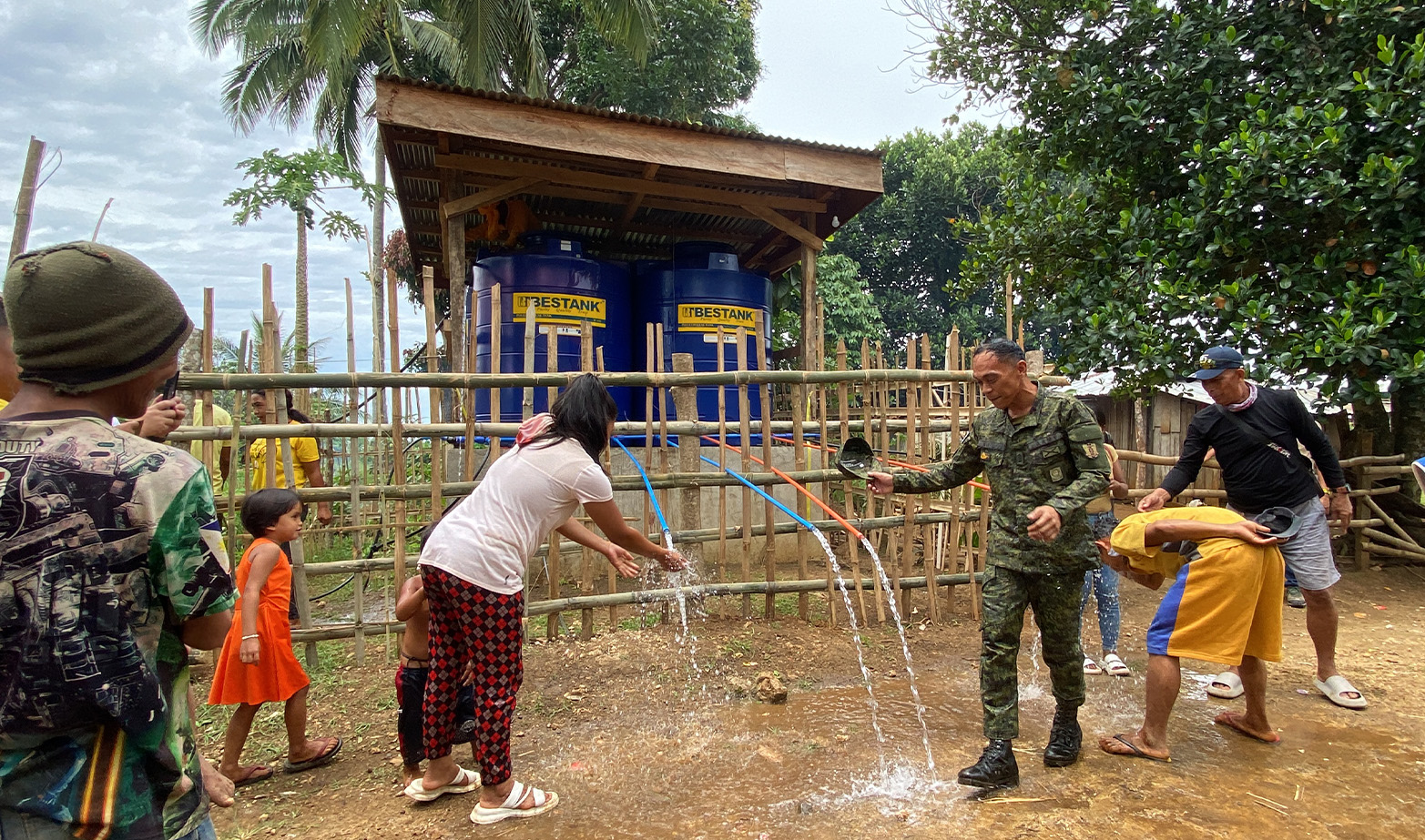
The community and some military personnel celebrate the opening of the new water system in Bekbeken.
- admin
- 11 April 2025
- Feature
Making World Water Day 2025 Celebration A Reality: the Bekbaken Story
Written by Sweet Edrote and Kayessie Suga/ Samdhana |
Sitting atop a hill in Brgy. Cabadiangan, Kadingilan, Bukidnon, the Menuvu community of Bekbaken experienced clean, running water right in their backyards on March 22, 2025 at exactly 11:40 in the morning – the day when the people around the globe commemorates World Water Day 2025. After 68 years of no access to water, this is the culmination of their efforts to secure water for their children and the community.
But it has been a long, difficult journey to this moment of success. Bekbaken, with 148 households sits in the middle of the contested geopolitical boundaries between the Municipality of Carmen, North Cotabato and Kadingilan, Bukidnon. This is a hotspot of conflict, historically and politically.
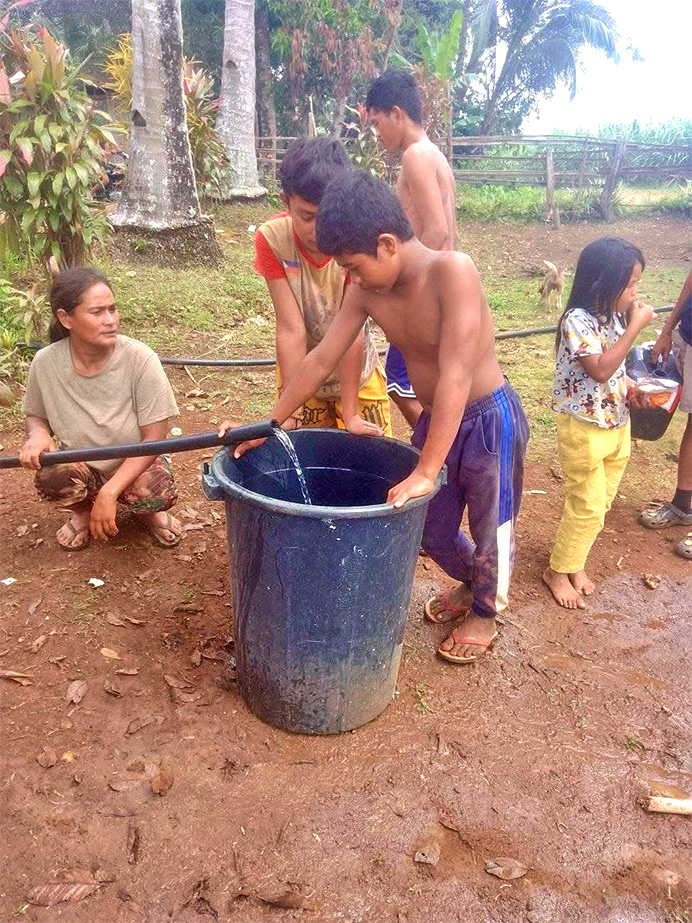 Land mortgages, land grabbing, renting and selling are some of the issues they face within their ancestral domain. The dispossession and tensions began way back in 1984, at the height of the revolutionary activities of the New People’s Army (NPA). In 1998, during the fight for autonomy by the Moro Islamic Liberation Front (MILF), the community was wrongfully labeled as being involved in the former’s revolutionary activities. These conflicts that took place in their territory for many years made them very vulnerable to involuntary displacement. They were left with no choice but to abandon their lands and could only stand witness as individuals took over, some who were allegedly government and military officials. Their farmlands were converted into commercial crops, notably oil palm and sugarcane. This became a precedent for the entry of many other parties to lay claim to their land, despite the fact that they are within the recognized Certificate of Ancestral Domain Title CO-RO12&10-COT&BUK03-2015-01, covering 48,699 hectares (CADT 202).
Land mortgages, land grabbing, renting and selling are some of the issues they face within their ancestral domain. The dispossession and tensions began way back in 1984, at the height of the revolutionary activities of the New People’s Army (NPA). In 1998, during the fight for autonomy by the Moro Islamic Liberation Front (MILF), the community was wrongfully labeled as being involved in the former’s revolutionary activities. These conflicts that took place in their territory for many years made them very vulnerable to involuntary displacement. They were left with no choice but to abandon their lands and could only stand witness as individuals took over, some who were allegedly government and military officials. Their farmlands were converted into commercial crops, notably oil palm and sugarcane. This became a precedent for the entry of many other parties to lay claim to their land, despite the fact that they are within the recognized Certificate of Ancestral Domain Title CO-RO12&10-COT&BUK03-2015-01, covering 48,699 hectares (CADT 202).
At present, out of the 1,500 hectares of ancestral land of the Bekbaken community, merely 50 hectares remain in their ownership. As they struggled to reclaim their land, they started to farm again in 2011. Unfortunately, they had to mortgage again another two hectares at PhP 150,000.00 (approximately US$ 2,678 based on the average current exchange rate), for a 12-year contract, because of failed harvests. This predicament and lack of control on their assets are just like the experiences of other Indigenous communities in Southern Bukidnon.
Aside from those pressing needs, community members have long been burdened by their difficulty to access potable water. Three government agencies, namely the Dept. of Public Works and Highway (DPWH), the Dept. of Social Welfare and Development (DSWD), and the Office of the Presidential Adviser on Peace, Reconciliation and Unity (OPAPP) provided a water reservoir project in 2017. According to the community members, it was approximately worth PhP 6.8 million but this project was not functional and residents were not able to utilize the reservoir. There are also water reservoirs in the neighboring area which is about five kilometers away from Bekbaken. But it usually dries up during summer and leaves them with no choice but to trek down to the main water source and back up. It takes them around three (3) hours to fetch water, and usually, if they go on feet, they are only able to collect twenty liters or one container of water. For those who are lucky enough to have horses, then they can collect as much as 80 liters in one trip.
Dreaming to make their right to water a reality
Every summer the tribal community experiences drought, especially in 2024 when there was a long drought. They shared that it became a common practice for them to request a glass of water from their neighbors. But eventually, everyone’s water supply gets consumed, then, the residents resort to harvesting coconut to quench their thirst. While it is a good natural alternative, some of the children do not like to drink coconut water. In times when they are very hard-pressed, they have no choice but to find other means, especially since the cost of purchasing water is prohibitively high. One gallon is priced at PhP 40.00 (US$ 0.71). The community also shared most of them will prefer to borrow water than rice. On average, each household needs about two gallons of water per week just for drinking and cooking. Even this they cannot afford because many of them are farm laborers in the sugarcane plantations, earning only PhP 250.00 ($4.46). This is the severity of the situation the Menuvu families go through and the impact of water scarcity in their daily lives.
They worked hard to find means to bring the water closer to their home. Having clean water close at hand means that, not only can they satisfy their basic needs with relative convenience, but they can also be freed from the discrimination that other people casually cast on them. The parents said that having water means their children will be able to go to school “nga nakaligo na ug dili na ingnun ang among mga kabataan nga mga ‘walay ligo’” (able to take a bath and no one will say that their children are filthy).
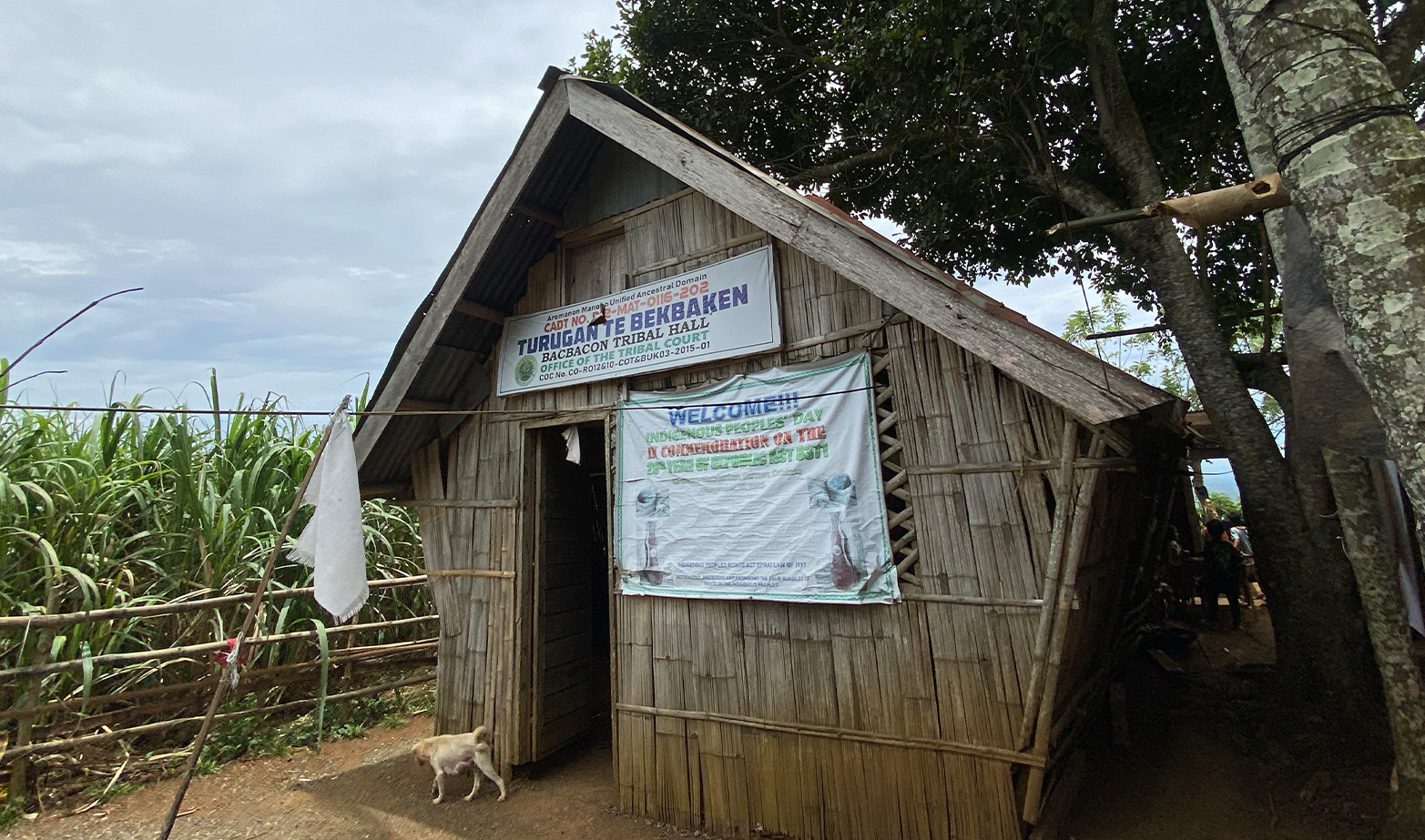
They also see that having water will enable them to have more time to focus on reclaiming and protecting their lands.
Datu Romeo Damlas, one of the Menuvu Sitio leaders of Bekbaken, shared that their community is a victim of patronage politics. A complaint was raised by local government officials, questioning as to why the water system project is being given directly to the community, whereas they demanded that it should go through the Barangay Local Government Unit (BLGU). The community asserted that they have a right to decide on this project because of their self-governance in their territory. Because of the community’s assertion, Datu Romeo was removed from his position as Sitio Leader in the BLGU.
They said they do not want a repeat of what happened before, that there is a water system project from the government worth millions, but until now, there is no water delivered to the community.
“Bahala nalang ug mawad-an ko ug posisyon, basta mapadayon ug dili mapug-ngan ang water system project ug amo ning angkonon kay para ni sa among mga Kabataan.” (It does not matter if I lose my position, as long as the water system project continues. We will claim this project because it is for our children.)
Because of the tension with the BLGU, the community felt that they were being given a hard time in the processing of their documentary requirements for the water system. They decided, through their buron-buron or community meeting, that they will find other means to complete their requirements. They consulted FIBECO, the electric utility cooperative, on what alternative documents they can provide to complete their application. They were indeed successful, and have the power connection to run the water system.
Despite the community's efforts, some individuals expressed skepticism that their water system project will be successful, claiming that their efforts were of no use given that the water source is located 490 meters above sea level, referencing a previous project from 2017, which cost PhP 6.8 million but ultimately failed to establish a reliable water system.
But for them, their determination to overcome these challenges serves as an inspiring reminder on how the power of community solidarity can persist, especially on the basic human right: access to clean water.
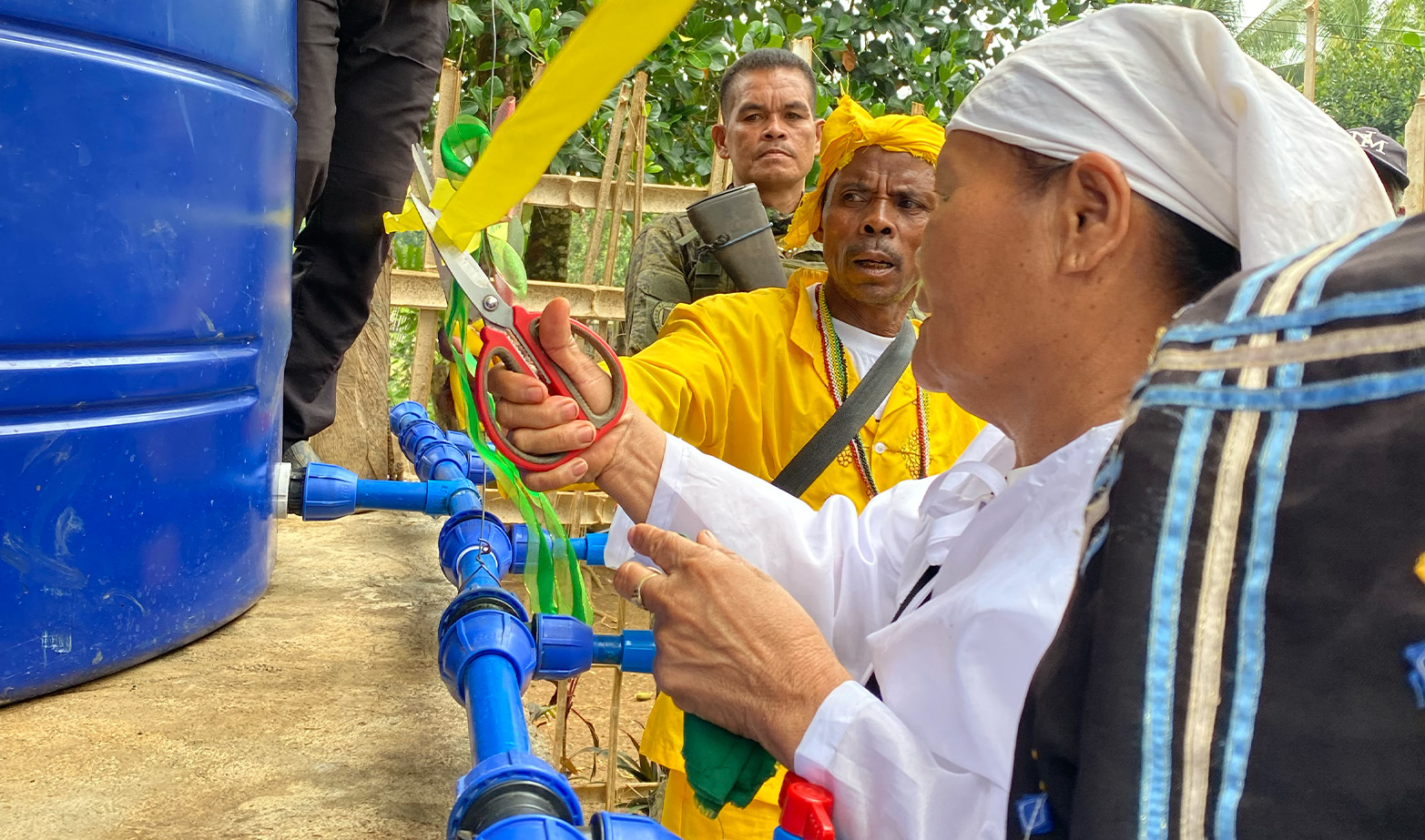
Community Initiatives
The Menuvu community of Bekbaken also have their own forest conservation and restoration efforts. Currently, they have set aside six hectares and have started plating on two hectares. They planted native trees such as tugas (molave), lawaan, bakan, gisok and piton, which they recognize as a traditional tree. They hope that they will be able to replant and bring back all the traditional trees they know from their forests.
The Bekbaken community continues to reach out to government agencies to ask for the basic services and support, especially for the youth. With the help of Nicanor Tahuyan, the Municipal Indigenous Peoples Mandatory Representative (IPMR) of Don Carlos municipality, the community secured an education support for 50 school-aged children.
Samdhana has been working with the Bekbaken community for almost two years to date. In 2023, Samdhana provided an urgent action grant to more than 140 indigenous households that were displaced because of a crossfire between the military and unidentified lawless groups. Aside from providing grant support, Samdhana provides direct capacity building on paralegal skills for the community.
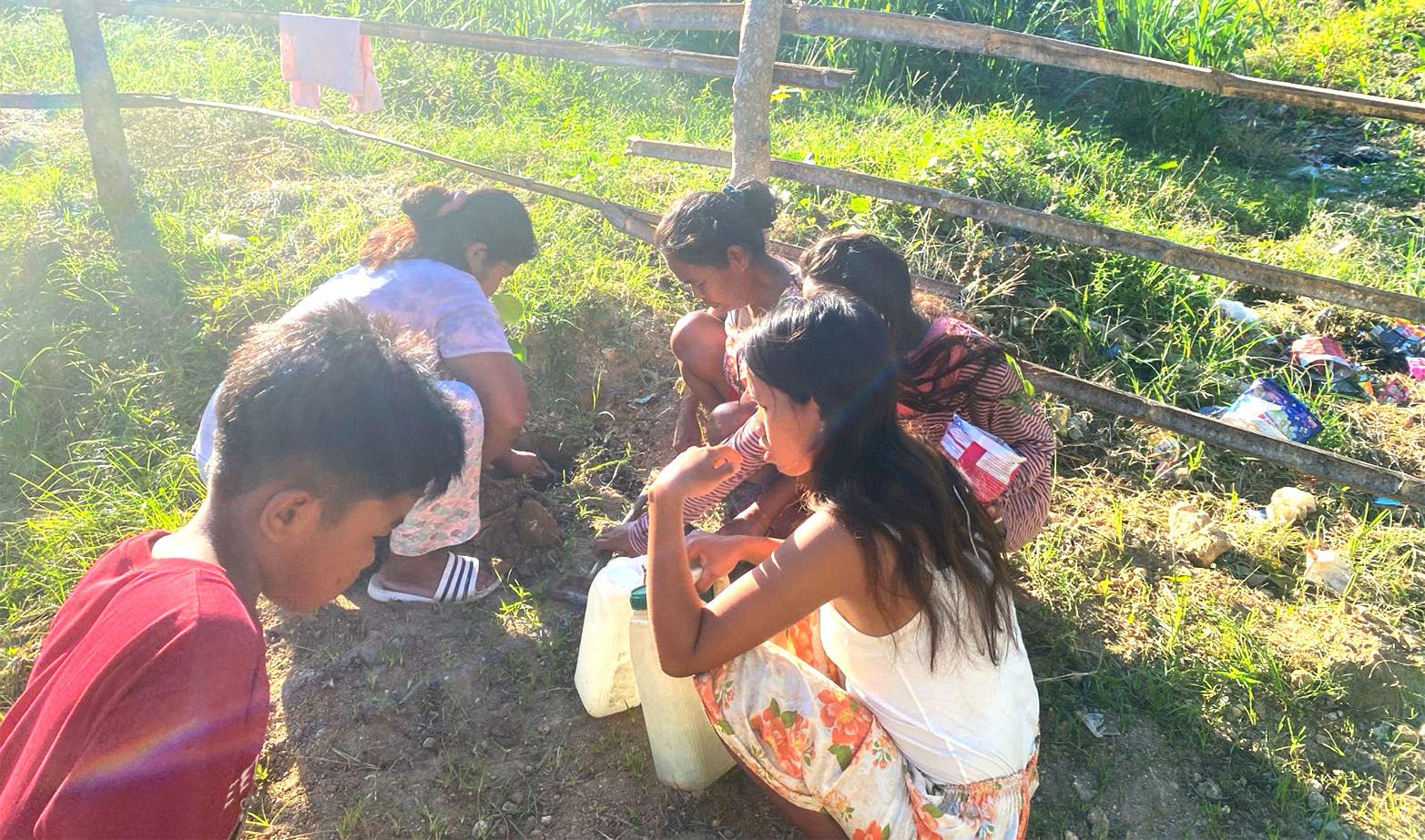
Tepeney Te Wahig – A Celebration of Community’s Struggle and Joy
On April 4, 2025, the Bekbaken community came together in a celebration like no other, during the Tepeney Te Wahig, which was the formal event to mark the completion of their water system project. The program was attended by all community members, neighboring communities from both Provinces of Bukidnon and North Cotabato, and other Menuvu tribe clans. There were also members of the 48th Infantry Battalion detachment, CAFGU Active Auxiliaries (CAA), from the National Commission on Indigenous Peoples (NCIP) Region 12, and from the Barangay Local Government Units of Cabadiangan, and Makabenban, and other guests. In a stirring moment, they sang the Philippines’ National Anthem in the Menuvu language. During the celebration, the community members recalled their life-long challenges in accessing clean water, and the invaluable gift that a simple community water system has given to them.
Gagang, a Memeriten, shared that when the community started the construction for the water system, everyone had to contribute even a small part to make the work faster. One of the most difficult part was carrying the construction materials from their Tulugan to the water source 1,400meters away. She was forced to take time off from her usual household chores. According to her “Isa na ka sako ang bulingon, ug mas gipili nako ang pagpanglaba didto sa water source. Pero ang akong anak nag sige ug ingon nga “Ma, undangi sa imohang paglaba kay magtabang ta sa ilaha.” Wala ra ko nagbali-bali kay ang ako feeling na dili gihapon moluntad ang project. Pero nag sige akong anak ug panghagad nga mutabang. Ug didto nako nakita nga gusto kaayo sa akong anak nga makatubig na mi. Mao tong gi-undang ko ug pagpanglaba ug nagdala mi sa akong anak ug upat ka kabilya. Nagtabang mi pagpanghakot sa mga materyales ug wala namo bati-a ang kakapoy sa tulo ka oras na pagsakwat sa mga kabilya gikan sa Tulugan paingon sa water source. Kadugayan, nakaingon na akong anak nga, “Ma murag nauplok na akong liog sa kakapoy.” Sa panahon nga ni-agas na ang among tubig human sa pipila ka mga katuigan nga wala gyud mi tubig, nakaingon ko sa akong kaugalingon nga “Unsa pa man amo panginahanglanon kung naa nami tubig. Amo gyud ni ibalik sa tanan membro sa among komunidad, gikan sa mga bata nga nagdala ug tagsa ka salmon nga balas hangtod sa mga hamtong. Kay kung wala mi nagtabang o nag-donate sa among kusog, dili gyud mapaigo ang among budget.” (My laundry items had reached one sack already, and I chose to wash clothes at the water source. But my child kept on urging that I should stop washing and help out first. I did not pay any attention back then because I felt that the project will not progress. But my child kept on urging me to help. And at that point, I realized how much my child wanted for us to have water. So, I stopped my laundry, and my child and I carried 4 lengths of steel cable. We helped in hauling the materials, and we did not feel tired for the three hours of hauling steel cables from the Tulugan to the water source. Eventually, my child said he felt like his neck already shrank into his shoulders from all the weight. At the time when the water finally flowed from the pipes, after so many years that we did not have any water, I said to myself, what else will we need if we already have water. We really give credit back to all members in the community, from the young children who carried even just one can of sand so they could contribute, all the way to the adults. Because if we did not help out, or we did not donate our strength, the project budget would not be enough. ###
